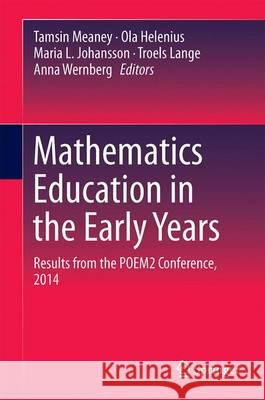Mathematics Education in the Early Years: Results from the Poem2 Conference, 2014 » książka



Mathematics Education in the Early Years: Results from the Poem2 Conference, 2014
ISBN-13: 9783319239330 / Angielski / Twarda / 2016 / 443 str.
Mathematics Education in the Early Years: Results from the Poem2 Conference, 2014
ISBN-13: 9783319239330 / Angielski / Twarda / 2016 / 443 str.
(netto: 575,06 VAT: 5%)
Najniższa cena z 30 dni: 578,30
ok. 16-18 dni roboczych.
Darmowa dostawa!
This book presents chapters based onpapers presented at the second POEM conference on early mathematics learning.
Introduction.- An historical overview of early education policy and pedagogy: Global perspectives and particular examples.- Very Young Children.- Playing with patterns - Lessons learned from a learning study with toddlers.- Creating a mathematics environment.- Learning and teaching.- What is the difference? Young children learning mathematics through problem solving.- Children´s Play as a Starting Point for Teaching Mathematics in Preschool.- Opportunities to learn mathematics while playing traditional dice games.- Poor mathematics performance of South African students points towards poor mathematics foundation of young children.- Mathematical processes.- What is Play As a mathematical activity for preschool children?.- Mathematical reasoning at pre-school level.- Mathematically creative processes in early childhood.- Mathematical conversations in kindergarten.- Adaptivity as an developmental aspect of mathematical thinking in the early years.- Number understandings.- The Development of the Competence of Counting in a Child between three and six years with a specific Language Impairment.- Development of a flexible understanding of place value.- The role of conceptual subitising in the development of foundational number sense.- Mathematical content understandings.- „I spy with my little eye” … different components of a concept of length.- The Significance of the Equal Sign in The Development Of Early Algebraic Reasoning.- Technology in early childhood.- Tablets in Kindergarten – Seriously?!.- Preschool children’s learning to think mathematically using an interactive table.- Dragon box and algebraic thinking.- Transitions.- The interactional niche in the development of mathematical thinking (NMT) in the familial context.- Investigating the potential of home learning environments for early mathematics learning.- Families and educators working together to assist young children notice, explore and discuss mathematics.- Mathematical understanding in the transition from kindergarten to primary school.- Preschool Teachers.- How to promote preschool-teachers' mathematical awareness.- Reflection– An opportunity to connect different aspects of professional competencies in mathematics education.- From instruction to construction: Fostering preservice teachers' “mathematical awareness”.- Preschool teachers' operationalising of mathematical goals.- Post-script.
Tamsin Meaney is professor of mathematics education at Bergen University College, having previously been professor at Malmö University. She has worked in teacher education in New Zealand, Australia, Sweden and Norway. Her research interests are varied but centre around the need for mathematics education to support social justice concerns. Whilst in Sweden she started the research group, Young Children's Mathematics.
This book presents chapters based on papers presented at the second POEM conference on early mathematics learning. These chapters broaden the discussion about mathematics education in early childhood, by exploring the debate about construction versus instruction. Specific sections investigate the teaching and learning of mathematical processes and mathematical content, early childhood teacher development, transitions for young children between home and preschool, between home and school and between preschool and school. The chapters use a range of innovative theoretical and methodological approaches which will form an interesting basis for future research in this area.
1997-2026 DolnySlask.com Agencja Internetowa
KrainaKsiazek.PL - Księgarnia Internetowa









